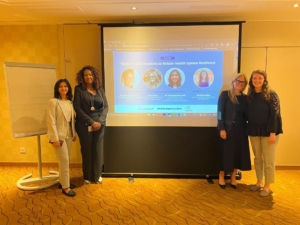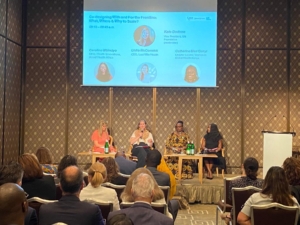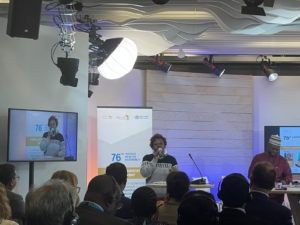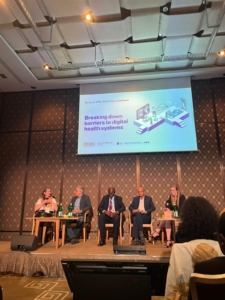In May, delegates convened for the 76th World Health Assembly in Geneva, Switzerland, to set a course for the World Health Organization’s policies and priorities. This year’s theme: Saving lives, driving health for all.
The Last Mile Health team was on the ground at WHA76, with CEO Lisha McCormick and Senior Director of Communications Siobhan Kelley speaking on panels to advocate for paid, professional community health workers as a powerful driver toward achieving universal health coverage. We were energized by the conversations, collaboration, and shared momentum among health leaders and peers in the community health space. Here are our key themes and takeaways:
There is growing momentum to ensure the community health workforce is at the center of the agenda to achieve universal health coverage—particularly in the lead-up to the UN General Assembly and the High-Level Meeting on UHC in September.
Investment in professionalized community health workers (CHWs) as a catalyst for achieving universal health coverage (UHC) was a central topic at WHA76. As Catherine Chacha Menganyi, Women in Global Health Kenya chapter leader, said, “Without health workers, there is no UHC.”
But it’s not enough to have CHWs in place: they need to be professionalized and embedded in systems that allow them to succeed. As Last Mile Health Lisha McCormick said at a side event co-hosted with Johnson & Johnson and Amref, “CHWs need to be skilled, supervised, salaried, and supplied to provide high-quality care to their neighbors, and also be embedded into national systems operating at scale.”
This focus on professionalization, including equal pay for female health workers, was echoed by our partner Global Health Coalition, who delivered a strong constituency statement during the Pillar 1 discussion on “One billion more people benefitting from universal health coverage.” Notably, African leadership on professionalizing CHWs was highlighted, with WHO’s Dr. Bruce Aylward citing the Monrovia Call To Action as an example for the world.
And momentum continued to grow to embed professionalized CHWs in the Political Declaration on UHC, which will be adopted at the High-Level Meeting on UHC in September. As our partner Community Health Impact Coalition reports, “The Zero Draft for the Political Declaration on UHC maintained the five proCHW priorities embedded within the previous version and now also includes digital health systems at community level. There is also now an explicit mention of CHWs being a skilled workforce, as well as language on #payCHWs and gender considerations being stronger.”
But the growing health worker shortage continues to hold the global community back from meeting this potential. As WHO Director-General Dr. Tedros Adhanom Ghebreyesus said during a roundtable on the health and care workforce, we must “protect, invest, together” to grow the health workforce and make urgently needed progress on UHC.
Power and privilege continue to prevent community health workers from leading the conversation at events like WHA76.
One of the few frontline health workers who was able to obtain a visa to travel to Geneva was Margaret Odera, a community health worker, advocate, and member of Africa Frontline First Catalytic Fund’s board. Speaking to a room of ministers of health and other high-level officials, she said, “I have to be bold for community health workers: pay us; recognize us; professionalize us!”
Though Margaret was a powerful voice for professional community health workers, she should not be the sole voice at the World Health Assembly. It’s critical that conversations on community health center the voices of those closest to the work—but as long as systemic barriers make travel inaccessible based on citizenship, this will not be possible. This inequity highlights an urgent need for global change.
For the first time, the WHA included a roundtable on climate and health—a vital step forward in building climate-resilient health systems that protect the most vulnerable.
The climate crisis is a health crisis, and the world’s most vulnerable people face the greatest risk. As Amref Global CEO Dr. Githinji Gitahi said, “Health is the human face of climate change. The health impacts are real; therefore, health must be at the center of climate change conversations.”

Senior Director of Communications Siobhan Kelley (right) with co-panelists discussing digital solutions for health systems resilience.
Paid, professional CHWs are critical to ensuring countries can respond to threats, with a proven track record in responding to outbreaks like Ebola. In the words of Malawi Minister of Health Khumbize Kandodo Chiponda, “Resilience means you build systems that can withstand shocks.” A strong and well-supported community health workforce is key to developing resilience at the last mile as climate and health threats become increasingly severe.
“If we embrace a health-centered response to climate change, with smarter investment, we can have catalytic impact across multiple sectors,” explained Vanessa Kerry, CEO of SEED.
And Last Mile Health board member Wendy Taylor of Jhpiego stated the need in concrete terms: “We need trained, equipped health workers that have the reflexes to respond.”
Investing in proCHWs is investing in climate-resilient health systems—and for those living at the last mile, where health and climate crises are already a lived reality, this moment is critical for investment.
Health equity requires gender equity.
“Women contribute $3 trillion to global health annually—half in the form of unpaid work,” said Last Mile Health CEO Lisha McCormick during a panel on gender equity and digital health. “That would make them the biggest financial contributor at WHA76.”
It’s time to change this reality by not only paying female health workers fairly, but also interrogating the barriers that prevent them from becoming part of the professional workforce in the first place. In Liberia, we worked with the Ministry of Health and Co-Impact to conduct a gender assessment of the national CHW program, which found that after five years of implementing the program, only 17% of the community health workers employed by the program are female—despite women accounting for 70% of the health and social care workforce globally.
In March 2023, the Liberia Ministry of Health launched a new ten-year community health policy, which institutionalizes many of the recommendations made in the gender assessment with a goal of increasing gender parity in the community health workforce.
Though this progress is important, we recognize the need to break down more barriers that hold women back as CHWs globally—and therefore also hold patients back from receiving the best possible care. As Women in Global Health wrote, “We will continue to call for a new social contract for women health and care workers based on fair pay, equal leadership, and safe and decent work for the women who largely deliver our health systems worldwide.”







